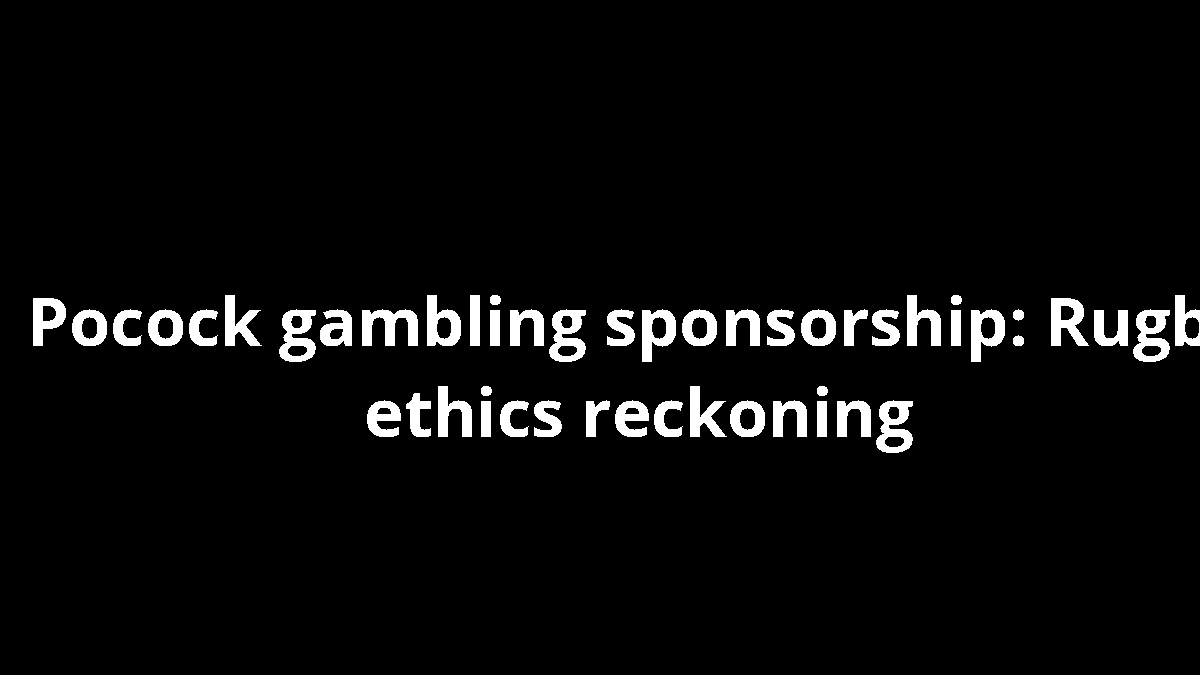Pocock gambling sponsorship: Rugby ethics reckoning
In rugby circles, Pocock gambling sponsorship has become a defining moment for governance and sponsorship ethics. Pocock gambling sponsorship is now a touchstone for fans, clubs, and lawmakers evaluating how money from the gambling sector can influence sport. Pocock gambling sponsorship sits at the center of debates about integrity, transparency, and the social contract between sport and public life. Pocock gambling sponsorship also reflects broader questions about commercial power and rugby’s culture, including partnerships that touch on government spaces and the reputations of players turned politicians. The conversation spans boards, terraces, and parliamentary lobbies, underscoring how sponsorship can shape public perception of rugby.
Context and scope
The case forces governance bodies to confront the delicate balance between funding and integrity. Meanwhile, rugby’s global ecosystem faces pressures to keep sponsorship aligned with social responsibility. In this moment, fans and regulators alike are asking for clearer boundaries between sport, politics, and money. The arc of Pocock gambling sponsorship is unfolding across clubs, committees, and media analyses, with implications that reach far beyond one nation. As scrutiny intensifies, rugby must demonstrate how sponsorship decisions are made, who approves them, and how conflicts are managed. World Rugby guidance and governance discussions guide this evolving debate, underscoring the need for robust safeguards. World Rugby emphasizes transparency and responsible sponsorship in its policy framework, which stakeholders say will be indispensable as the story develops.
Lead
From the parliamentary club incident to broader sponsorship policies, Pocock gambling sponsorship raises urgent questions about governance, transparency, and accountability. While revenue streams remain essential for rugby’s growth, the case tests boundaries and demands robust safeguards against conflicts of interest. The public nature of the controversy means clubs, federations, and politicians must articulate clear standards for sponsorship deals and sporting use of government-connected spaces. For readers, the evolving story offers a clear lens on how rugby’s commercial relationships interact with public life, and why the scrutiny matters for the sport’s reputation. In parallel, BBC coverage and expert commentary help frame the stakes and the plausible paths forward. BBC Sport Rugby provides ongoing context as stakeholders respond.
Key dynamics
Meanwhile, voices across the rugby world insist on accountability and practical safeguards. The debate centers on whether sponsorships from betting brands distort young fans’ perceptions or undermine competitive fairness. The answer, however, is not simply a yes or no; it requires nuanced governance, clear disclosure, and time-bound restrictions when public offices or former players participate in clubs with gambling ties. Media coverage, policy statements, and club-level guidelines will shape the outcome, while international bodies urge a balanced approach that protects communities and preserves the sport’s integrity. BBC Sport Rugby remains a key reference point for these discussions.
Background
David Pocock’s expulsion from Parliament’s social sports club after openly questioning whether the club should be sponsored by a gambling lobby has thrust the topic into the limelight. The decision, while procedural, highlights wider tensions between sponsorship revenue and ethical constraints within rugby-adjacent political spaces. Enthusiasts argue that sponsorship dollars support community programs, grassroots development, and match-day activities that sustain rugby ecosystems. Critics counter that gambling branding can normalize risky behavior and create perceived conflicts of interest when lawmakers oversee or attend clubs connected to government offices. The case thus sits at the intersection of sport governance, public accountability, and corporate influence, inviting a closer look at how sponsorship deals are negotiated and monitored. World Rugby and other bodies emphasize transparent processes to address such concerns, setting benchmarks for future arrangements.
Historical backdrop
Observers emphasize that sponsorship conversations have long stirred debate in rugby circles, but the current moment places governance front and center. As clubs seek stability and growth, they must balance sponsorship income with ethical considerations and public trust. The unfolding narrative also tests the relationships between rugby, politics, and business, reminding stakeholders that every sponsorship decision carries reputational weight. Meanwhile, analysts suggest that robust disclosure regimes, independent oversight, and sunset clauses can help manage risks while preserving the sport’s financial health. World Rugby guidance remains a touchstone for interpretation and practice.
The Controversy
The core controversy centers on whether gambling sponsorship is appropriate for rugby and for government-connected social spaces. Proponents argue that sponsorship funds community programs, youth rugby development, and regional events, ensuring the survival and growth of the game at multiple levels. Critics warn that gambling branding can normalize gambling, create conflicts of interest, and erode trust in public institutions that engage with sport. The expulsion event has intensified demands for governance transparency, independent reviews of sponsorship workflows, and clearer rules about public figures’ involvement in sports clubs tied to government offices. As stakeholders weigh safeguards, the conversation expands to include ethical guidelines for sponsorship, player welfare considerations, and the long-term impact on rugby culture. BBC Sport Rugby coverage underscores the gravity of the moment and the need for thoughtful policy responses.
Governance questions
Key questions focus on due diligence, risk assessment, and the independence of sponsorship decisions. How are deals structured to prevent conflicts of interest? What transparency mechanisms exist for government-linked clubs? Who verifies compliance, and how are breaches addressed? Critics call for independent audits, public disclosure of sponsorship terms, and explicit boundaries between political spaces and sporting activities. Supporters argue that well-managed sponsorship can fund essential programs without compromising integrity. The resolution will likely hinge on policy reforms, updated codes of conduct, and stronger oversight structures across leagues and clubs. BBC Sport Rugby remains a critical forum for these debates.
Reactions and Analysis
Fans, pundits, and policymakers offer a spectrum of interpretations, from condemnation to cautious endorsement. Some observers view the Pocock gambling sponsorship case as a teachable moment for governance, urging leagues to implement clear caps on sponsor categories and to enforce strict conflict-of-interest rules. Others see potential benefits in sponsorship revenues that support community programs, scholarships, and league development. The discourse increasingly invokes ethics and equity, with voices from broader sports governance communities weighing in. Meanwhile, analysts emphasize that public trust is the ultimate currency; without it, sponsorship models may struggle to endure through scrutiny and political changes. World Rugby commentary reinforces the need for balanced, principled approaches to sponsorship.
Fan and expert voices
Many fans want transparency about who funds clubs and events, and how funds are used. Experts argue that clear governance frameworks and independent reviews can restore confidence while preserving essential revenue streams. Meanwhile, sponsors and clubs are learning to navigate heightened expectations from players, supporters, and regulators. As the debate continues, Rugby News will track statements, policy shifts, and stakeholder positions to present a nuanced picture of where the sport goes from here. BBC Sport Rugby offers ongoing coverage of these developments.
Implications for Sport Sponsorship
The implications extend beyond a single incident. Policymakers and industry leaders are considering reforms that could redefine sponsorship norms across rugby and other sports. Proposals include stronger disclosure requirements, more robust conflict-of-interest controls, and explicit sunset clauses for sensitive sponsorships. Some argue for a tiered sponsorship framework that shields public institutions from high-risk brands, while others advocate for clear, easily auditable guidelines that permit revenue streams when properly managed. In any scenario, the emphasis remains on safeguarding integrity, protecting participants, and maintaining fans’ trust. The Pocock gambling sponsorship case has already influenced conversations about how to structure sponsorship layers, monitor compliance, and empower governance bodies to act decisively when concerns arise. World Rugby and national federations are likely to publish updated codes in the near term.
Policy and practice
Practical steps discussed in committees include appointing independent sponsorship monitors, conducting regular ethics reviews, and publishing transparent annual reports on sponsorship deals. Clubs may adopt stricter due-diligence protocols for partner selection and require clear public disclosures about how funds are allocated. Meanwhile, fans expect accessible explanations of sponsorship choices and their impact on community programs. The aim is to strike a balance where financial support for rugby does not eclipse the sport’s core values. As the debate evolves, rugby organizations increasingly reference established governance benchmarks and international best practices to guide decisions. BBC Sport Rugby continues to illuminate these policy debates.
Next Steps
Looking ahead, the story will hinge on official statements from the social sports club, Pocock’s office, and related parliamentary bodies. Audiences will scrutinize any appeals, policy proposals, or reform agendas that address sponsorship transparency and governance. In the near term, expect published guidelines, independent reviews, and potentially new codes of conduct that clarify when public figures should recuse themselves from sponsorship decisions involving gambling brands. As stakeholders respond, Rugby News will provide updates, expert takes, and practical implications for clubs worldwide. The overarching objective remains clear: protect the sport’s integrity while allowing sponsorship to fuel growth and community engagement.


